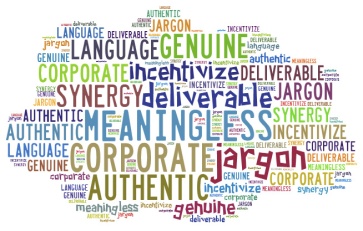By Whitney Matusiak
 I had a conversation with a friend of mine recently, and I casually mentioned my love for words. After that initial statement, irony set in, and I called my linguaphilia indescribable. Is that even possible? Have I failed my passion of writing and editing by being incapable of wielding its power to describe my love for it? I have a theory on this difficulty: Words are losing meaning.
I had a conversation with a friend of mine recently, and I casually mentioned my love for words. After that initial statement, irony set in, and I called my linguaphilia indescribable. Is that even possible? Have I failed my passion of writing and editing by being incapable of wielding its power to describe my love for it? I have a theory on this difficulty: Words are losing meaning.
Who’s surprised? In a world fraught with coined expressions, buzzwords and an under-appreciated history of English, it’s no wonder I feel surrounded by meaningless banter. On occasion, I prefer the mysterious illusion of sentiment because I don’t trust words (or maybe readers) enough to convey my feelings.
Lately it seems as though the sound bites of life fit into one extreme of corporate jargon, or the other of hippie nonsense. Both can fall on deaf ears after a time. The stuff in the middle is what’s been branded, pre-packaged and played ad nauseam: green design, sustainability, conscious uncoupling, authentic and genuine. If ever these words, terms and phrases had worthwhile definitions, it’s been a long time since we’ve heard them.
I had a teacher who detested the casual use of the word love. How can society use love to describe that unique feeling of admiration, respect and devotion to one’s counterpoint, then go on to love pizza? We’re guilty (some more recently than others, if you’ve read this article carefully) of watering down our lexicon. Funnily enough, English is described as being the best language to do business in because of its wide variety of words. While I think that’s true—there are a lot of words to choose from—we don’t seem to be exercising that attribute very well. In fact, I think we are recycling words too quickly.
We’re experiencing an exponential expansion of vocabulary, which is undoubtedly related to other exponential developments in the fields of business and technology. Hey, it’s normal, and it’s not to say that some of that pre-packaged, over-played verbal diarrhea doesn’t offer some value.
But we’ve got to give it time to mean something, before it means nothing. And we’ve got to dial back on coining new words and phrases to define the newest words and phrases. Grab a dictionary. I bet there are words—and definitions—you never thought existed, and they might be able to help you say exactly what you mean.
Whitney Matusiak is a freelance writer and editor for Jean Marie Creatively, providing copywriting, substantive, and copy editing services for corporate, academic, trade, and lifestyle publications.
This article was copy edited by Ana Trask.
